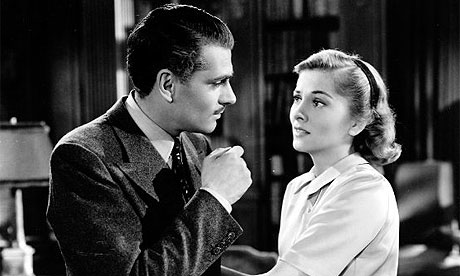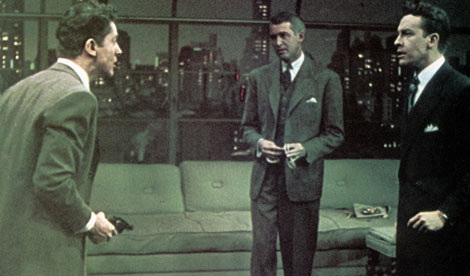"Last night I dreamt I went to Manderley again …"
Everyone who loves film knows the opening words of Rebecca, that astonishing mixture of emotional hothouse and freezer that was Hitchcock's first American film, made for David O Selznick and released in 1940. But for all the portent of that opening voiceover, or the symbolic drama of the great Cornish mansion burning down as the film ends, it's not about a place. It's not really a thriller, either, in any meaningful sense – despite the suspense of the closing reel.
Rebecca is a film about abusive relationships, and the way power might shift within them – and, most unusually, even for its time – its hero is the worst of the abusers. The romantic might view Laurence Olivier's Max de Winter as someone haunted by his past; the realist would see him as someone haunted only by his inability to control his past, specifically his titular deceased wife, and so he alights upon Joan Fontaine's gauche, clumsy (and nameless) gentlewoman's companion as a wife who will give him no trouble.
Briefly, Fontaine has accompanied the ghastly Mrs Van Hopper (Florence Bates) to Monte Carlo as her paid companion. There she meets de Winter, a dark and brooding widower, prone to staring moodily over cliff edges and contemplating death.
After a whirlwind romance – much of which consists of him admonishing her in tones that would see any modern man dumped on the spot (his proposal: "I'm asking you to marry me, you little fool") – they marry and return to his ancestral home, where Rebecca's old personal maid, Mrs Danvers (Judith Anderson, portraying a Miss Gulch of the servant class), makes the second Mrs de Winter's life a misery.
Everywhere she turns, Mrs Danvers summons the ghost of Rebecca, constant reminders of her own unsuitability for the role of châtelain of Manderley. Only when Manderley is destroyed and the mystery of Rebecca's death – accident, or suicide, or murder – is solved, can Mr and Mrs de Winter, and Mrs Danvers, be freed. And like her mistress, the latter must die to be free.
Rebecca was one of three films Hitchcock adapted from stories by Daphne du Maurier, and much the most successful. Du Maurier had been distressed by the liberties he took with Jamaica Inn; The Birds suffered in being transformed from a perfect, ever-tightening noose of a short story set in Cornwall into an expansive movie set on the California coast. Rebecca's near fidelity is owed to Selznick, who was "shocked and disappointed beyond words" at Hitchcock's first treatment of the story and told the director: "We bought Rebecca and we intend to make Rebecca."
The only significant departure from the novel was unavoidable. Du Maurier made Max de Winter a murderer: he killed Rebecca in rage at her affairs (feminist readings of the story posit her as its heroine; any modern reader will view her sympathetically the more they see of her husband). The Hollywood Production Code, however, could not allow a murderer to escape unpunished and so an accidental death had to be engineered. Clumsy it might have been, but because that plotline is tacked on at the end, it doesn't interfere with the mighty central pillar of the film: the desperate, suffocating, co-dependent relationships of Mr and Mrs de Winter, Mrs Danvers and Rebecca.
Reliant though the film is on dialogue, Hitchcock throws in those inimitable visual touches, too: Max staring over the cliffs to the Mediterranean, the sea swirling sickeningly beneath him, showing us his death wish; his sister explaining to the second Mrs de Winter how much Mrs Danvers loved Rebecca, and the screen fading to black behind Fontaine's face, a startling representation of the fall in your stomach when you hear something you have dreaded. And, of course, that critical, crippling moment when Fontaine descends the grand staircase to the Manderley masquerade ball, having been tricked by Mrs Danvers into wearing a replica of one of Rebecca's old gowns.
It's Fontaine's film, really, rather than Olivier's. He supplies the danger (though in the novel, the fact that Mrs de Winter conspires to conceal Rebecca's murder shows how she has been corrupted by her awful marriage), and she is our representative: the one who shows how we might fare transplanted into minor aristocracy. She's obviously too beautiful to be the mousy, dowdy wallflower the character demands, but by hunching her shoulders and darting her eyes, by playing up the clumsiness and never acknowledging her own beauty, she convinces. She has to: for without her, this would be only a film about vile snobs.
The reason Rebecca still grips lies in the fact that we can all see ourselves in Fontaine's role: everyone plunged into a new and unfamiliar milieu has felt her uncertainty and fear that they are the wrong person, in the wrong place. We have all had relationships in which we cannot be sure where the ground lies, in which the dynamics of power leave us isolated and clinging desperately to whatever fixed points we can find.
"Our marriage is a success, isn't it? A great success? We're happy, aren't we? Terribly happy?" Fontaine asks Olivier halfway through the film. He turns and strolls away from her. She continues, the note of desperate hope gone from her voice. "If you don't think we are happy, it would be much better if you didn't pretend." By now she's almost whispering. "I'll go away. Why won't you answer me?" And there, in those few seconds of speech, is the most human, heartbreakingly vulnerable person ever to appear in a Hitchcock film.











